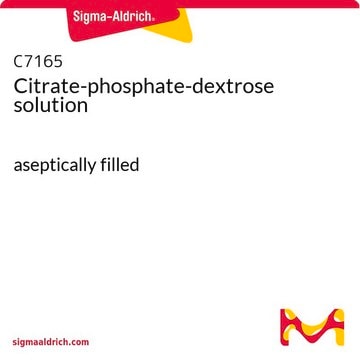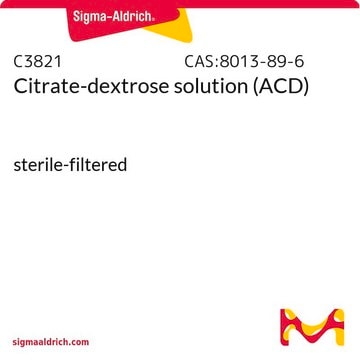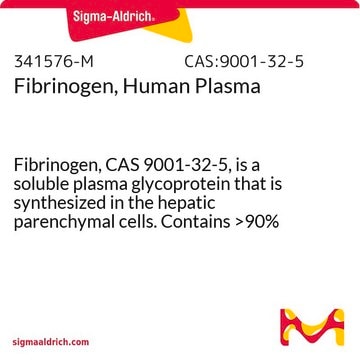C4431
Citrate-phosphate-dextrose solution with adenine
Synonym(s):
CPD-A
Sign Into View Organizational & Contract Pricing
All Photos(1)
About This Item
UNSPSC Code:
12161700
NACRES:
NA.25
Recommended Products
Related Categories
General description
Citrate-phosphate-dextrose solution with adenine (CPDA) is an anticoagulant and preservative for storage of blood. It can prolong red blood cell storage life up to 35 days. It maintains platelet viability. Usage of CPDA improves post-transfusion visibility and improves glucose and ATP levels in blood.
Application
Citrate-phosphate-dextrose solution with adenine has been used as an anticoagulant during blood collection from cardiac puncture, transgenic hen egg lysozyme-ovalbumin-Duffy (HOD) mice and humans.
Biochem/physiol Actions
Useful anticoagulant for whole blood
Recommended anticoagulant: whole blood ratio is 1:9
Recommended anticoagulant: whole blood ratio is 1:9
related product
Product No.
Description
Pricing
Storage Class Code
12 - Non Combustible Liquids
WGK
WGK 1
Flash Point(F)
Not applicable
Flash Point(C)
Not applicable
Certificates of Analysis (COA)
Search for Certificates of Analysis (COA) by entering the products Lot/Batch Number. Lot and Batch Numbers can be found on a product’s label following the words ‘Lot’ or ‘Batch’.
Already Own This Product?
Find documentation for the products that you have recently purchased in the Document Library.
Customers Also Viewed
HyunJoo Park et al.
Scientific reports, 6, 34257-34257 (2016-10-05)
The functionality and viability of stored human red blood cells (RBCs) is an important clinical issue in transfusions. To systematically investigate changes in stored whole blood, the hematological properties of individual RBCs were quantified in blood samples stored for various
James C Keith et al.
Arthritis research & therapy, 7(4), R769-R776 (2005-07-01)
The human leukocyte antigen B27 (HLA-B27) transgenic rat is a model of human inflammatory bowel disease, rheumatoid arthritis and psoriasis. Studies of chronic inflammation in other rat models have demonstrated activation of the kallikrein-kinin system as well as modulation by
Krishnan MohanKumar et al.
Nature communications, 10(1), 3494-3494 (2019-08-04)
Necrotizing enterocolitis (NEC) is an idiopathic, inflammatory bowel necrosis of premature infants. Clinical studies have linked NEC with antecedent red blood cell (RBC) transfusions, but the underlying mechanisms are unclear. Here we report a neonatal murine model to investigate this
Measuring cell surface area and deformability of individual human red blood cells over blood storage using quantitative phase imaging
Park H, et al.
Scientific reports, 6(6), 34257-34257 (2016)
A monoclonal antibody against kininogen reduces inflammation in the HLA-B27 transgenic rat
Keith JC, et al.
Arthritis Research & Therapy, 7(4), R769-R769 (2005)
Our team of scientists has experience in all areas of research including Life Science, Material Science, Chemical Synthesis, Chromatography, Analytical and many others.
Contact Technical Service










